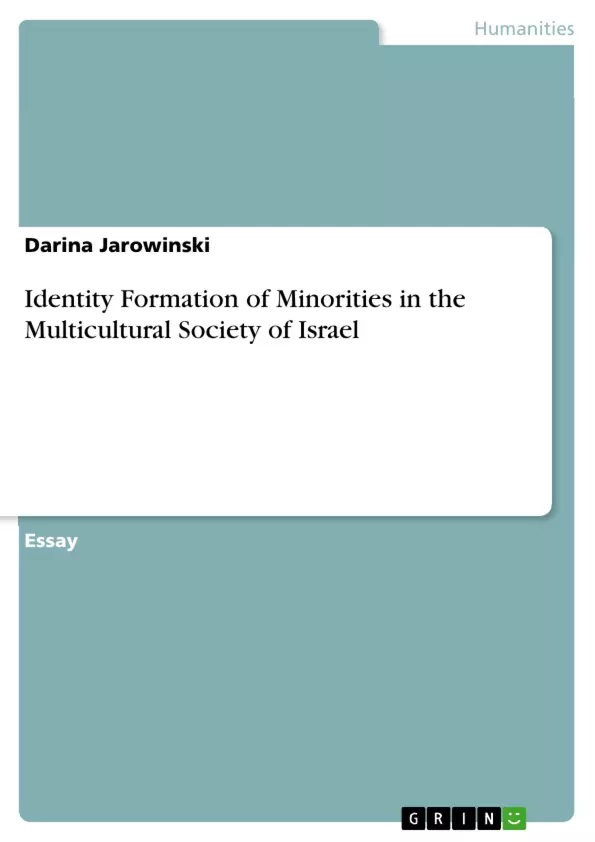Since the state’s foundation in 1948, Israel has developed from an agricultural country with poor infrastructure into a high-tech nation among the twenty leading industrialized countries in the world. To date, about three million people from less developed countries have been integrated. Many Holocaust survivors are welcomed to start a new life in Jewish homeland.
These facts usually get out of sight in the daily reporting of attacks and bloody clashes, especially in the most irresponsible picture coverage. Political confusion, outbursts of hatred and fragility of previous peace agreements negatively affect the way European society faces Israel. Especially news broadcasts on television as well as newspapers construct a, sometimes simplified and stereotypical version of the events that then enter cultural memory.
However, not only Israel’s significant growth has to be taken into consideration. Israel’s development is contradictory and by no means only positive. One of the most exceedingly difficult things to deal with is Israel’s fragmentation not only in the external appearance but also concerning internal debates about identity, belonging, religious questions, questions of solidarity and minority. After its sixty-fifth anniversary, Israel is still a state in the making, whose borders remain to be determined amidst growing tensions and crises. The rapid economic development provides new opportunities while feeding old tensions and creating new ones. As in other globalized countries, rapid growth emphasizes the difference between society’s core and those on the peripheries.
Since it is impossible to capture all the different interpretations of the events that have occurred in the past in this paper, it is concentrated on central issues that capture the identity development and formation of Israeli citizens, especially concerning Arabs in various contexts throughout the time.
Inhaltsverzeichnis (Table of Contents)
- Introduction
- Israeli society
- Importance of history
- Identity
- Studies of social identities
- Arabs in Israeli society
- "Israelization" versus "Palestinization"
- Arab identity repertoire in Israel
- Conclusion
Zielsetzung und Themenschwerpunkte (Objectives and Key Themes)
This paper explores the identity formation of minorities, particularly Arabs, in the multicultural society of Israel. The paper examines how Israel's history, societal changes, and internal debates influence the development of individual and collective identities. Key themes include: * **Identity Formation in a Multicultural Society:** The paper focuses on how individuals and groups negotiate their identities within a complex and multifaceted Israeli society. * **The Role of History:** The paper investigates the impact of historical narratives and cultural memory on the formation of identity, particularly the ways in which different groups interpret and represent the past. * **Minority Experiences:** The paper examines the unique challenges and opportunities faced by minorities in Israel, focusing on the specific case of the Arab population. * **Internal Tensions and Societal Changes:** The paper analyzes the tensions and challenges arising from the diverse and evolving nature of Israeli society, including questions of belonging, solidarity, and religious differences. * **"Israelization" versus "Palestinization":** This theme delves into the competing narratives and experiences of Arab identity in Israel, exploring the ways in which individuals and groups negotiate their cultural and political affiliations.Zusammenfassung der Kapitel (Chapter Summaries)
Introduction
This chapter introduces the context of Israel's development, highlighting the country's rapid growth, internal complexities, and the ongoing debate about identity, belonging, and solidarity. It focuses on the need to understand the identity development of Israeli citizens, particularly Arabs, within the changing social and political landscape.Israeli society
This chapter discusses the diversity and changing nature of Israeli society, emphasizing the historical role of immigration and the influences of national, religious, and ethnic divisions. It contrasts contemporary perceptions of Israeli society with earlier characterizations, highlighting the impact of mass immigration and the evolving societal dynamics.Importance of history
This chapter explores the role of history in shaping identities and understanding cultural memory. It argues that historical narratives are constructed, selected, and represented in ways that reflect power relations and societal needs. The chapter emphasizes the importance of considering multiple perspectives on historical events and the impact of these narratives on identity formation.Frequently Asked Questions
What is the focus of identity formation in Israel?
The focus is on how minorities, specifically Arabs, negotiate their identity within a multicultural society marked by historical tensions and rapid economic growth.
What is meant by "Israelization" vs "Palestinization"?
These are competing narratives of identity for Arabs in Israel, reflecting the tension between integrating into Israeli society and identifying with Palestinian national aspirations.
How does history influence Israeli identity?
Historical narratives are constructed and represented to reflect power relations, significantly affecting how different groups perceive their belonging and solidarity.
How has Israeli society changed since 1948?
Israel transformed from an agricultural state into a high-tech nation, integrating millions of immigrants, which created new opportunities but also emphasized social disparities.
Why is Israel called a "state in the making"?
Because its borders remain to be determined and internal debates about identity, religion, and the role of minorities continue to evolve amidst ongoing crises.
- Quote paper
- Darina Jarowinski (Author), 2013, Identity Formation of Minorities in the Multicultural Society of Israel, Munich, GRIN Verlag, https://www.grin.com/document/287732



